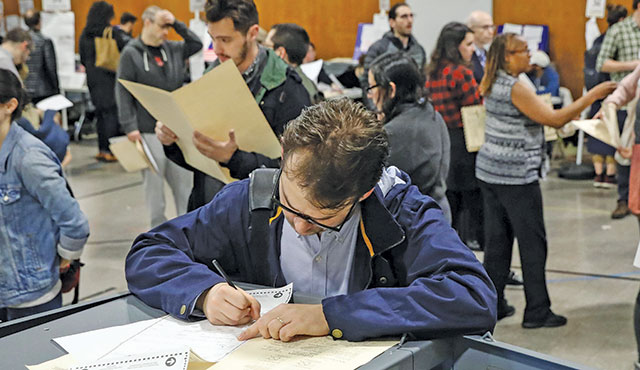ALTHOUGH MUDSLINGING is about as old as politics itself, in the modern age of hyper-partisanism, not to mention social media, it seems to have taken a particularly odious turn. The rancorous discourse, which only figures to ratchet up with the 2020 national and presidential elections looming, has seeped into the society, communities, parishes and families as well, increasingly setting people at odds.
This has caused leaders in the faith community to stand up and say, “Enough already.”
In response, the United States Conference of Catholic Bishops in December announced “Civilize It: Dignity Beyond the Debate,” an effort to promote “civility, love for neighbor and respectful dialogue.” The bishops have asked Catholics to sign and share a pledge on Civilizeit.org to be respectful in their families, communities and parishes.
According to the bishops, “The initiative is built on the recognition that every person—even those with whom we disagree—is a beloved child of God who possesses inherent dignity.”
Civilize It builds on a similar effort implemented in the Archdiocese of Cincinnati in previous election years. It is being offered in concert with a wider ecumenical effort, Golden Rule 2020 (goldenrule2020.org/).
In the Diocese of Orange, Father Al Baca, who returned to the diocese as director of the Office of Evangelization and Faith Formation after serving with the U.S. Conference of Catholic Bishops, said he works to act with civility, patience and respect and expects that from all in his office in matters political and otherwise. “We try to model that patience,” he said.
Although Fr. Baca did not mention any upcoming programs yet that specifically focus on Civilize It or election-year behavior, he did note that all diocese programs are predicated on respect and that Bishop Kevin Vann has addressed the issue from the pulpit.
A main trap that leads to rancor, Fr. Baca said, is when people personalize their arguments.
“It seems the only way to avoid that is to focus not on the people and the candidates, but the issues. No one gets hurt that way,” he said. “But when candidates and people are involved, it’s hard to get back to ‘What were we talking about? What was the issue?’”
Personal attacks are nothing new in the political landscape.
John Adams, the second president of the United States, once called Alexander Hamilton, born out of wedlock, “the bastard son of a Scotch peddler.” In turn, Adams was once labeled in a political piece as “a hideous hermaphroditical character.”
While little in the modern age sinks quite so low, sensitivity has also been heightened and Catholics have urged political leaders to tone down the rhetoric. Fr. Baca recalls Bishop Jaime Soto, who, during his tenure as president of the California Catholic Conference, wrote in 2016 about the need for civility in political discourse.
“That’s when I recall I thought about it a lot,” Fr. Baca said, “and how on the parish level it seemed to be seeping into the community.”
In 2016, more than 5,600 religious sisters of the Leadership Conference of Women Religious, which represents about 80 percent of the 49,000 sisters in the U.S., signed a letter asking for civil discourse in the presidential election season. “We simply ask that all who seek to lead refrain from language that disrespects, dehumanizes or demonizes another,” the letter said. “We pray that all who seek to influence public opinion will be mindful of the common good and respectful of the dignity of each and every person.”
The letter also quoted remarks Pope Francis made in a 2015 address to Congress that said, “Unfortunately, we live in a time when our politics is too often marked by self-interest and demeaning rhetoric. We seem to be caught in a political system paralyzed by ideological extremism and hyper-partisanship.”
Bishop Frank J. Dewane, of Venice, and chairman of the USCCB’s Committee on Domestic Justice and Human Development, said in a statement, “‘Civilize It: Dignity Beyond the Debate’ is a call for Catholics to honor the human dignity of each person they encounter, whether it is online, at the dinner table, or in the pews next to them.”
Fr. Baca says rather than concentrating on a candidate’s personal resonance, or dissonance for that matter, people should consider how the candidate’s ideology conforms not only with their conscience but with their Catholic conscience.
That should cause the voter to “slow down, step back and look at the issues that are important to them. That really has to be the determining factor.”
As for keeping family get-togethers from turning into casserole-tossing free-for-alls, Fr. Baca says it may be best in advance to agree to talk about non-combative topics.
“For some families there may be issues they can agree on. They can enjoy being with each other and that can lead to a gentle time.”

